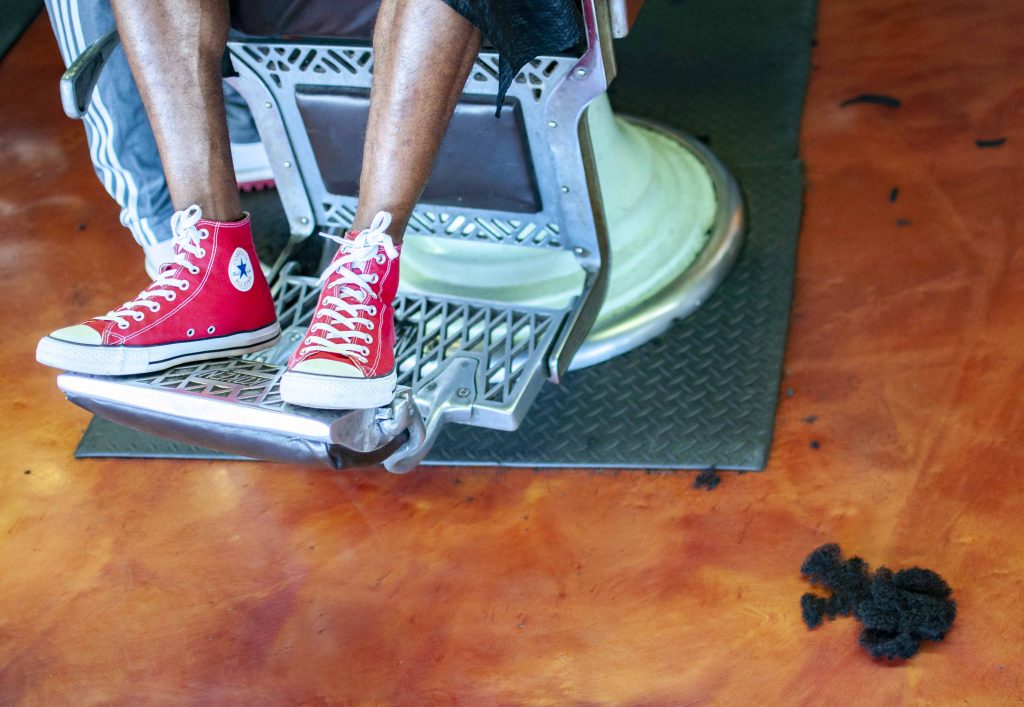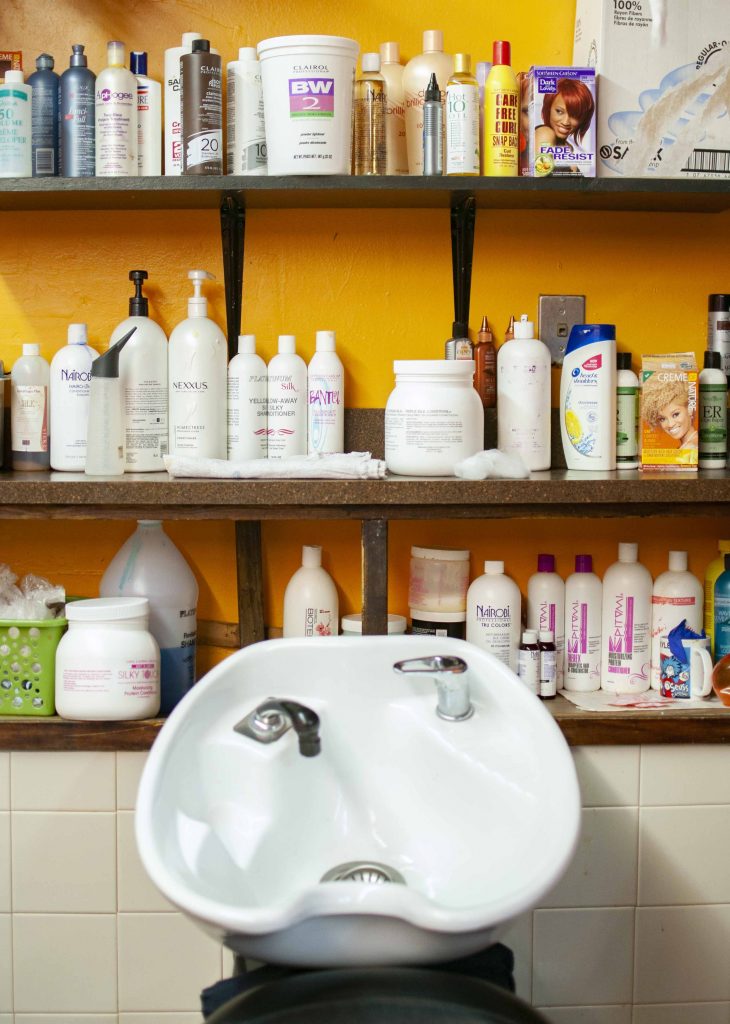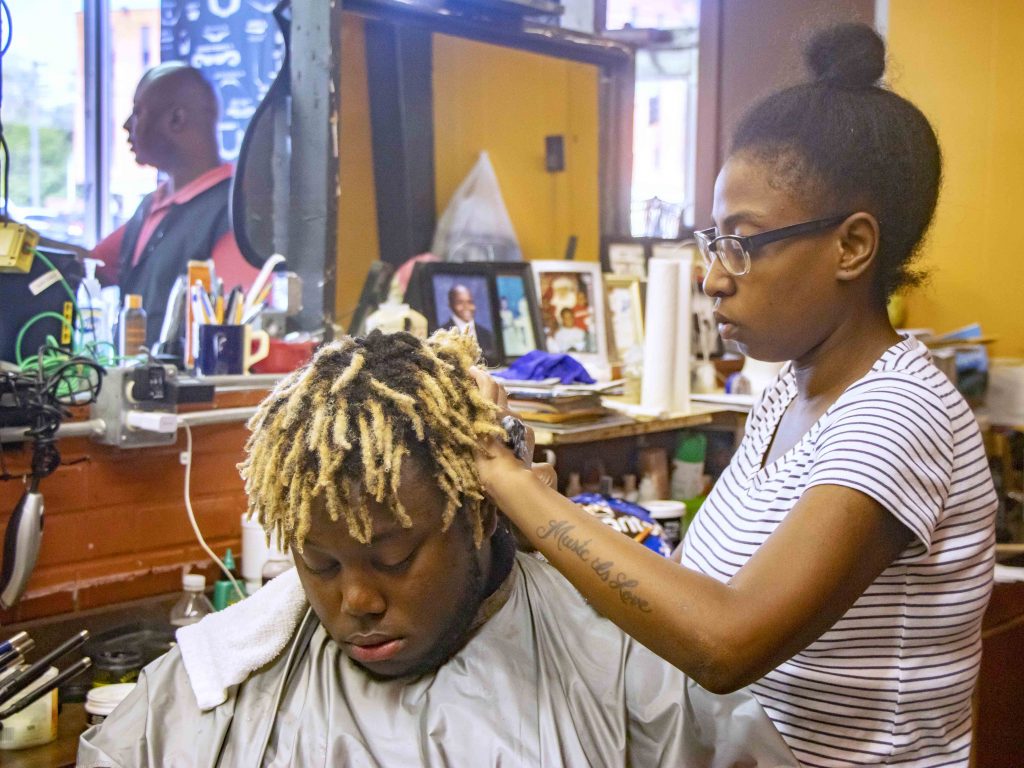Willie Goolsby began cutting hair more than 50 years ago and has owned and operated Goolsby Hair World since 1968. Although the shop now serves a multicultural clientele, there was a time when black and white people did not patronize the same barbershops or beauty shops.
“They thought I was so good that they wanted my services, but they didn’t want to publicize it. On Sunday mornings, I had the shop closed, but they got together to get me to say that I would work on Sunday mornings,” Willie Goolsby said. “I had a shop full of white people, shaving and cutting their hair on Sunday… This went on until the 70s.”

In 1980, the shop moved to its current location off the Square on East Jackson Avenue. Willie Goolsby said people broke the windows in his shop three or four times in the 1980s.
“White people didn’t want me to have it. They didn’t particularly want me in this area. They let me know that,” Willie Goolsby said. “Some of them would yell, wrote notes and different stuff.”
Today, Goolsby Hair World is a barbershop in the front and beauty shop in the back that provides a wider variety of services than when the shop first started and only catered to men. Customers can get their eyebrows shaped, hair braided, beards trimmed and hair colored.
Carolyn Goolsby, the daughter of Willie Goolsby, hairstylist and shop manager at Goolsby Hair World, said she began doing hair in 1992 “because of the family,” and she has “always had a passion for it.” Today, she works alongside her mother, father and a shop full of barbers and stylists.
Carolyn Goolsby said that since she’s been doing hair, she and other barbers and stylists have served people of different races every day at Goolsby Hair World.
“We service men, women, children. We service all different races… I don’t think a week would go by that there wouldn’t be somebody of a different race that would be here,” Carolyn Goolsby said. “It’s more common now; like today we might get 10 to 12 haircuts that aren’t black people.”
But, the history of hair care, especially African-American hair, is complicated and extensive. The cultural impact dates back to the period of slavery in the United States, according to Jodi Skipper, an associate professor of anthropology and southern studies at Ole Miss.

“We don’t know that much about hair politics in enslaved communities because we don’t have the records for it outside of… people dealing in slave trading of people who were considered fugitives and describing their hair,” Skipper said.
As early as 1745, slave owners would publish runaway slave advertisements in newspapers and would describe the slave’s physical appearance, which often included details about his or her hair, according to the National Humanities Center’s Virginia Runaway Slave Advertisements.
One 1772 advertisement in the Virginia Gazette stated, “Though his Hair is of the Negro Kind, he keeps it very high and well-combed; but, as he wants to be free, I imagine he will cut it off, and get a Wig to alter and disguise himself.”
“I think the politics of respectability in hair… really comes into play when people start to think about integration into white societies and what does it mean to look respectable, and black hair, (or) hair that you might consider coarser hair, relatively would not fit into that model,” Skipper said.
Respectability and hair eventually gave way to the rise of Madam C.J. Walker’s hair care business for African-Americans in the 1900s. Walker was one of the first women to become a self-made millionaire in America.
“Madam C.J. Walker coming in with hair products, you start to get a hair care industry. The fact that she could become a millionaire meant that she’s got a significant clientele, obviously, and desire and need for this,” Skipper said.
Today, African-Americans spend over $470 million in the $4.2 billion hair care industry, according to a 2018 study published by Nielsen. Although African-Americans make up 14 percent of the U.S. population, 85 percent of the total amount of money spent on “ethnic hair and beauty aids” was by African-Americans.
This is seen in Oxford with the presence of a variety of African-American barber and beauty shops and stores, such as Goolsby Hair World, Tammy’s Hair Gallery and New York Fashion.
Tammy Herod is the owner and operator of Tammy’s Hair Gallery on University Avenue and began her business in Oxford in 1989. She said that her salon is multicultural and that she does “all types of hair, not just black hair” every week.
African-American barber and beauty shops are “not just about getting your hair done,” but they also serve as “safe spaces for black people,” where they can openly discuss community events and political topics, according to Skipper. Barbershops and beauty shops became spaces for information, especially during the Civil Rights Movement.
“You could go there and hand out flyers without the risk of white folks knowing that you’re politically mobilizing,” Skipper said. “Black church, to some extent, might have been known for that, but I think, to a huge extent, folks are not looking at these black hair shops and going ‘oh there’s political moves being made in there.’ That’s exactly what was happening.”

Barbershops and beauty shops are still commonly seen as safe spaces today. Sophomore criminal justice major Calvin Baker and junior secondary English education and political science major Arielle Hudson both said they gain more than just new hairstyles when leaving shops.
“You get man talk. Everytime you come out the barbershop, you get more information about how to just be a man,” Baker said. “Being at the barbershop, it brings you together.”
Hudson has been going to beauty shops since she was in elementary school. Today, she wears hairstyles that complement her thick, curly tresses, such as protective styles, sew-ins and silk presses, and gets her hair done every three weeks to a month.
“It’s just always been a thing to try to look your best… I’m used to seeing my family members with their hair always done pretty nice,” Hudson said. “I feel like when you’re in the beauty shop, there’s a judge-free zone from other women you all know that you’re there to come out looking your best.”
Herod of Tammy’s Hair Gallery said her goal is to help her customers in more ways than just hair.
“My vision here is to not just make people look good on the outside, but it’s beauty from the inside out,” Herod said. “I really try to do what I can to help the total person, not just their hair.”
Historically, barbershops and beauty shops “developed along racial lines” and were spaces “where African Americans escaped the glare of white eyes,” according to the Center for the Study of Southern Culture’s Mississippi Encyclopedia.
“There are places that white folks do not enter still today to a large extent, and there are very few integrated hair care spaces still. Much of the country, I think, is still that way… I think it has to do with them being relatively safe spaces that don’t seem political,” Skipper said.

























